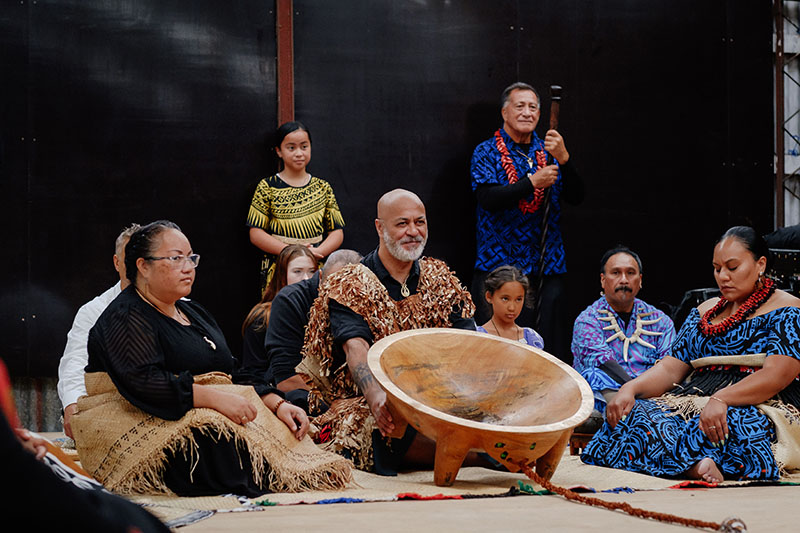
Teokotai Paitai (Taukava, kava mixer), flanked by the Angaikava (assistants), tips the tanoa (kava bowl) toward the Olovaha. Picture: Jinki Cambronero/22082604
A Cook Islands Māori filmmaker has looked into a collective of Pasifika cultural guardians reactivating the ancient Tu’i Tonga kava ceremony for contemporary use in Aotearoa New Zealand.
Josh Baker has been drinking deep from a cultural well. The filmmaker is awaiting the premiere of his documentary Kava 'o Aotearoa, which will be screened on August 31. The eight-minute documentary is the culmination of months of work, and hundreds of hours of filmmaking.
He decided to look examine the Tu’i Tonga kava ceremonies after witnessing it being practiced in late 2021.
“They were made up of three leaders who kind of took charge in setting up the kava event which occurred annually,” Baker says.
“Once I saw what the group does with the use of kava, creating a space for different minority groups, I thought it would be a great idea to create a documentary about them.”
Producer Maria Tanner shared Baker’s enthusiasm for the idea.
“Kava appeals to many different kinds of people for many different reasons. Pasifika peoples use it in ceremonies to allow equilibrium amongst the group to allow for an effective talanoa due to the calming effects of drinking kava,” she says.
“It is also a part of the enua (land) and the act of drinking kava is sacred because it is the consumption of the land, which is sacred to Pasifika peoples.”
Baker said a lot of convincing needed to take place to secure the interviews.
“The idea kind of sat with them for a while. I had to assure them that it’s a collaboration between filmmakers and cultural practitioners,” he says.
“One of the biggest lessons for me was that I had to remind myself that I’m on Māori land. If I was back in the Cook Islands, there would be no issue because of my background as a Cook Islands Māori.”
Baker nonetheless felt that his Cook Island Māori background helped in getting people to talk to him.
“A lot of the Pacific Island cultures are quite similar; we all have this Kaupapa around how we live every day,” he says.
Producer Maria Tanner said the project helped her understand her place living as a Pacific Islander in Aotearoa New Zealand.
“It’s recognising that I’m part of a community that wishes to connect with traditions, but doesn’t want to do so in a way that leads to another act of colonisation,” Tanner says.
“The kava ceremony was led by Tangata Whenua, and I thought that was really beautiful. This is not something that would be practiced in the islands, the group widened their circle to make them the guest of honour.
“Though there are variations amongst the kava ceremonies performed around the Pacific, the core concept remains the same - the consumption of kava to bless an occasion and allow for talanoa to take place.
“What differs with Kava ‘o Aotearoa is the combination of different aspects of each kava ceremony from the different island nations and bringing them together to design a new kava ceremony that is specifically for Aotearoa.
“What makes it unique is that it puts Tangata Whenua in a position of high regard and is reserved for the chief. Women are also an important part of the Kava ‘o Aotearoa ceremony because they are placed in roles that are usually reserved for men.”

Tanner says they had to be “brutal” in their editing the hundreds of hours of footage to eight minutes.
“If we had the chance to get a couple of extra minutes, we would have used some of the really beautiful things that the leaders said about their cultural identity. I think we would have explored that,” she says.
“I always find value in connecting with people, so when we had the chance to sit down and meet the subjects face-to-face, it deepens your understanding of them as humans.”
Baker says the documentary made him rethink his own cultural standing.
“Listening to the interviews of the subjects, they had a lot of teachings and lessons that I took with me,” he says.
“I think I want the audience to just think about the indigenous people of Aotearoa. We want people to just be conscious of their practices, and not ignore Tangata Whenua.”
Baker adds the process of filming taught him patience and that making a documentary was very fluid.
“We captured all this amazing footage, and amazing interviews, but it was ultimately told in a way that I didn’t think it could be told,” he says.
“If you going to create a documentary, it’s in the hands of the people you interview. You just have to trust the story will come through the process of the edit suite.”
Tanner says they tried to involve the subjects every step of the way.
“This was a conscious decision of ours. We shared many iterations of the cut right up to picture lock,” she says.
“Of course, seeing the final graded product, they were all very proud and are blown away by the message that it has for the viewers, that land sovereignty and land rights should remain with the original people of the land, the Indigenous people, in this case it is Tangata Whenua.”
Baker says he would like to make more films about Cook Islanders.
“Whether it is documentary or scripted drama, that would be amazing. We have practitioners in the Cook Islands who are doing it out of love. I hope to one day go back to a Cook Islands where arts and culture is a sustainable entity.”
Kava ‘o Aotearoa was made through Someday Stories Series 6 and will be available to stream on Someday Stories Facebook, PlayStuff, RNZ and Whakaata Māori On Demand from August 31.












































